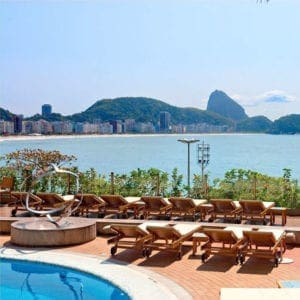
 The Millennial traveller, defined by age as being born between 1980 and 2000, already makes up over one third of the world’s hotel guests, with predictions that they will reach over 50 per cent by 2020. As the travel and hospitality industry gears up for the biggest disruption in decades, key attributes like design, experience, mobile and perceived value are imperative for attracting the millennial traveller. There has never been a demographic that is more connected, digitally savvy and demanding, and wanting contemporary design, high quality amenities, smart technology and locally inspired ambience, all wrapped into a single hotel experience.
The Millennial traveller, defined by age as being born between 1980 and 2000, already makes up over one third of the world’s hotel guests, with predictions that they will reach over 50 per cent by 2020. As the travel and hospitality industry gears up for the biggest disruption in decades, key attributes like design, experience, mobile and perceived value are imperative for attracting the millennial traveller. There has never been a demographic that is more connected, digitally savvy and demanding, and wanting contemporary design, high quality amenities, smart technology and locally inspired ambience, all wrapped into a single hotel experience.
With boutique hotels and fast-growth start-ups disrupting all aspects of the industry, innovation is also coming from within some of the largest corporates, who are aware that disruption and reinvention will drive their own relevance and bottom-lines in the future. The world’s leading hotel chains have been gearing up for some time with the emphasis on launching and acquiring Millennial-inspired hotels, including Hilton, Starwood, Intercontinental, Marriott and Best Western Hotels. These hotels are being forced to rethink hotel and room design, guest services and experiences, ethical footprints and smart features to cater for the Millennial customer that wants to be able to discuss, organise, book and customise their experiences through their mobile at their own convenience.
Smart technology
User experience has never been more important for the truly connected Millennial traveller, with high expectations in discovery, payments and mobile experience prior to and during their stay.
The W Hotel group lets tech-savvy guests unlock their rooms in some of their hotels with an Apple Watch or smartphone while Scandinavian hotel group HTL Hotels enables both check-in and room access through the smartphone. Taking it a step further, Japan’s Henn-na Hotel is staffed with life-like robots that greet guests, carry bags and even clean rooms once a guest leaves. The aim of the hotel is to create an all-round hi-tech experience, including facial recognition software to open doors.
On-demand generation
Smart hotel brands are integrating the right on-demand services, making them seamless for guests to access and use, whether it is quick access to prices, amenities or room service via their own branded-apps or messaging tools like Whatsapp.
For example, the Ritz-Carlton app enables guests to order extra towels or toiletries, luggage pickup or housekeeping services directly from their mobile. While the Conrad Concierge app allows guests to choose their rooms prior to checking in and order room service during their stay. Best Western’s new Vib hotel chain even offers automated check-in and a virtual concierge service and Sheraton Frankfurt Airport hotel has even implemented WhatsApp to communicate with guests. WhatsApp enquiries include pricing information, booking enquiries, lost property enquiries, as well as travel questions. The hotel has implemented a successful five minute turnaround time to all Whatsapp enquiries.
The sharing economy
Driven by Airbnb becoming one of the world’s largest hotel groups without having to own a single hotel, traditional hotels are increasingly having to apply Sharing Economy features to the hotel experience. These features include communities, value, trust and social connections.
Created by MIT’s Mobile Experience Lab, Marriott Hotels launched Six Degrees, a physical social network encouraging hotel guests to engage in the physical space through an app, digital wall projection and an interactive wooden table in the lobby. The system used guests’ LinkedIn accounts to pull information on the guests, including where they work and what their interests might be. Guests could express interest in organised activities from jogging in the park to craft beer tasting, through the app.
Developed in the Netherlands and created to provide value for millennials, Zoku markets itself as the end of the hotel room and the beginning of the infinite room. The hotel rooms include neat design features such as pullout stairs, drawers and sliding doors that help convert the room into a variety of multipurpose spaces, depending on the needs of the guest.
“In our research, we found that what young people like about a hostel, for example, is that they jump out of their bunk beds, go down to have a coffee, and chat for two hours with new people,” said Hans Meyer, co-founder and managing director at Zoku.
Meaningful experiences
It has never been more important to deliver deeper experiences to travellers by focus on inspiration, personalisation and local experiences.
Marriott’s Residence Inns, for example, now hosts weekly theme nights called the Mix to help millennials connect with local culture. This can include dessert samplings, live music in the lobbies, local food trucks and fire pit nights. The Hilton Hotel’s Canopy brand provides Millenials with a welcome gift from a local bakery upon arrival and access to local fitness centres and local wine and beer tastings. HTL Hotels offers guests a personalised concierge service to help them discover the city’s hidden gems and uncover the local’s favourite eat, drink and shopping spots in the city. And even Four Seasons has got in on the action with their branded Food-Truck tours in cities across America.
Hotel design
Hotel design is being transformed to cater for the millennial traveller through the evolution of lobby design, common social spaces and the more efficient use of space in hotel rooms.
London’s newest boutique hotel Laslett hotel looks to capture the rich cultural heritage and local contemporary scene of Notting Hill within the design of the hotel, making the ground floor more of a neighbourhood hangout than a traditional hotel lobby. It incorporates a curated British library, walls of art, the Henderson bar and coffee which serves an evolving menu of dishes supplied by celebrated local chef Sally Clarke and her Bakery, and a shop showcasing collaborations with designers and artists.
Larger hotel chains are also in on the act. Best Western has launched a new boutique brand called Vib, short for Vibrant, which includes contemporary and modern design, local design elements from the location of the hotel, large creative spaces, personalised food & beverage options, green-friendly features and vending machines where customers can purchase a variety of amenities including apple headphones.
“This was a natural evolution for us. We wanted to make sure there was going to be a really amazing product for the guests,” says Best Western’s Managing Director of Design Amy Hulbert.
Even the traditional no-frills hostel market is getting a makeover with brands. For example Freehand Hotel, which offers tourists the opportunity to mix with locals in the lobby, plush couches with coffee and handcrafted tiles lining the walls. European hostel brand Generation Hostels has also created lavish common areas with fantastic bars, cinema rooms and areas for yoga in their 10 ‘poshtels’.
“We’re trying to capture people who are curious and people who want to experience design and want to experience something local,” said Josh White, Chief Strategic Officer.
Price sensitive
Lets face it, even though millennials require all these additional features from their hotels, they are still price sensitive, wanting more for less. The future of hotels will likely see the unbundling of hotel amenities, as the airline industry has successfully done in the last few decades.
The new Virgin hotel brand addresses this through money-saving initiatives like free happy hours from 6pm – 7pm and minibars that offer affordable items for once. The hotel group also focuses on convenient features such as free early check-ins, late check-outs and even free last minute cancellations. Whilst hotels like Tune Hotels, offer a ‘pay as you go’ system where guests pay extras for TV, Wifi, towels and even toiletries.
From boutique hotels to large hotel groups, the millennial traveller is most certainly redefining the hospitality industry’s definition of a hotel.
About the author
 After graduating with a 2:1 BSc Economics degree in 2003 from the University of Manchester, Rupa Ganatra started on the RBC Capital Markets graduate training programme. At age 29, she became Head of Middle East Sales for Equity Derivatives. She has launched two businesses since leaving the investment banking industry and has gone on to be named one of Management Today and The Sunday Times 35 under 35 Women in the UK in 2014. She is co-founder of award winning Yes-Sir.com, a global online retailer specialising in men’s grooming brands including luxury designer brands as well as Yes Sir’s own range of male grooming products.
After graduating with a 2:1 BSc Economics degree in 2003 from the University of Manchester, Rupa Ganatra started on the RBC Capital Markets graduate training programme. At age 29, she became Head of Middle East Sales for Equity Derivatives. She has launched two businesses since leaving the investment banking industry and has gone on to be named one of Management Today and The Sunday Times 35 under 35 Women in the UK in 2014. She is co-founder of award winning Yes-Sir.com, a global online retailer specialising in men’s grooming brands including luxury designer brands as well as Yes Sir’s own range of male grooming products.
Additionally, in 2013 Rupa co-founded Brand us Social with entrepreneur Viktoria Kozyulko. It is a forward-looking Social Media and Digital intelligence and events company providing news, data and conferences focusing on educational, actionable and inspiring content curated by the industry’s top strategists and entrepreneurs. In January 2015, Swiss events company im2 Group has come in as a business partner to help scale and grow the business. The company is now launching a new event series under the name Millennial 20/20.
The Millennial 20/20 Summit is the world’s first gathering of brands, businesses and industry leaders who target the Millennial generation. The inaugural event will take place in London on the 13th-14th April, 2016, at B1, Victoria House, Bloomsbury in London.
Over the two-day period, Millennial 20/20 will host over 150 speakers, 40 interactive and experiential showcases, 50 panel discussions, 24 keynote presentations and interviews.
With four dedicated industry tracks of fashion and beauty, food and beverage, travel and hospitality, and sport and fitness, Millennial 2020 will feature highly curated and challenging discussions across eleven pillars; marketing, retail, design, mobile, payments, video, social, e-commerce, CRM, big data and merchandising.
For more information please visit: www.millennial20-20.com















